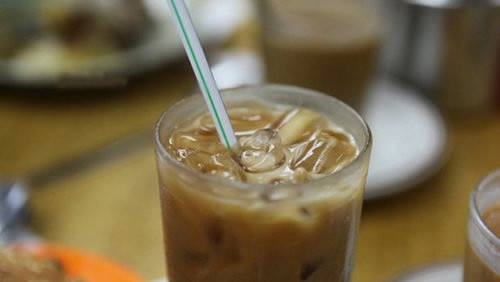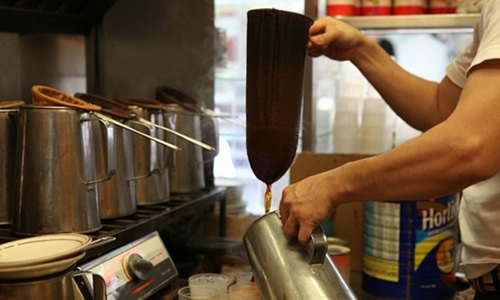
China
10:40, 31-Oct-2017
Popular milk tea drinks pose health risks to consumers
CGTN

Milk tea, a popular drink made of a tea base mixed with milk and sweetening flavors, is widely consumed by Chinese and increasingly welcomed by global consumers. Yet a recent health inspection has revealed that the popular drink may contain excessive amounts of sugar and caffeine, China Central Television (CCTV) reported on Sunday.
By sampling 51 varieties of milk tea drinks sold across milk tea specialty shops across Shanghai, Shanghai Consumers Council cooperated with local food quality inspection station to carry out a comparative experiment testing sugar and caffeine contents of the sampled drinks.
Among the 27 types of regular milk tea chosen at random, experts found that a cup of 470-milliliter drink contains 33 grams of sugar on average.
One of the sampled milk tea drinks contains 62 grams of sugar, an equivalent to 13 cubes of sugar.

Brewed tea is mixed with milk when making milk tea. /Xinhua Photo
Brewed tea is mixed with milk when making milk tea. /Xinhua Photo
According to the Chinese Dietary Guidelines, no more than 50 grams of added sugar should be consumed per day, and the recommended daily added sugar intake is below 25 grams.
Knowing the high sugar content of milk tea, many consumers opt for the sugar-free options made available at many milk tea shops. However, results showed that the 20 samples of alleged sugar-free drinks were only free from added sugar, but none of the drinks was actually free from sugar.
“The wrong claim may confuse consumers and pose safety risks to those with health conditions like diabetes,” Cao Huliang, a staff member working at a food quality inspection station told CCTV.
During the experiment, Cao also found out that the average caffeine content of all 51 chosen drinks far exceeds the international recommended per serving amount.

A popular milk tea brand Heekcaa topped with milk froth. /Sohu Photo
A popular milk tea brand Heekcaa topped with milk froth. /Sohu Photo
According to the European Food Safety Authority’s widely recognized guideline on caffeine intake, “single doses of caffeine up to 200 milligrams do not give rise to safety concerns.” However, the average caffeine content of the milk tea samples is 270 milligrams.
Most consumers don’t realize the health risks because milk tea drinks sold at specialty shops don’t have labels showing nutrition facts.
“Given the fact that there are no existing regulations over milk tea drinks, adding excessive sugar may not be illegal for the moment. But failing to inform customers of nutrition facts is an act of depriving their rights,” Li Genxi, a law expert from China Consumer Rights and Interests Protection Law Society told CCTV.

SITEMAP
Copyright © 2018 CGTN. Beijing ICP prepared NO.16065310-3
Copyright © 2018 CGTN. Beijing ICP prepared NO.16065310-3